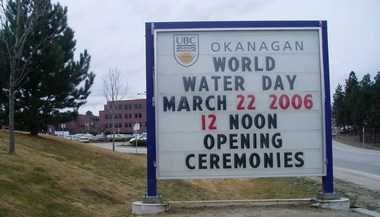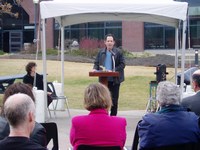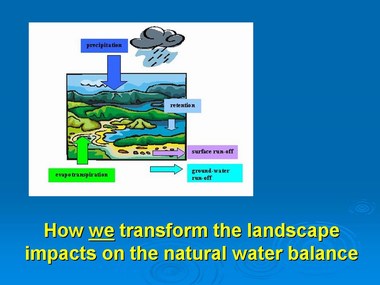UBC Okanagan University Celebrates 2006 World Water Day

Water Sustainability Action Plan the focus of keynote address
UBC Okanagan University celebrated World Water Day on March 22. The schedule of events included a Panel Discussion on Water Challenges and Solutions, and a Keynote Address on Convening for Action: Moving Towards a Water Balance Way-of-Thinking and Acting in the Okanagan. Click on this link to download the World Water Day Poster produced by UBC Okanagan.
To Learn More:
To access stories published in the Kelowna Capital News, click on these two links: Plea made to better respect nature and Balancing Water, Land Use

World Water Day
World Water Day is observed around the world on March 22 as a result of initiatives undertaken by the United Nations beginningin 1993. Many millions of people in the developing world do not have adequate access to clean drinking water and it has been estimated that one third of the world’s population will experience severe water scarcities within the next 25 years.
 According to John Wagner (Assistant Professor in Community, Culture and Global Studies) who was responsible for organizing the UBC-Okanagan event, “Here in the Okanagan we are facing our own water issues as a result of unsustainable forms of development that are now leading to unprecedented levels of habitat and species
According to John Wagner (Assistant Professor in Community, Culture and Global Studies) who was responsible for organizing the UBC-Okanagan event, “Here in the Okanagan we are facing our own water issues as a result of unsustainable forms of development that are now leading to unprecedented levels of habitat and species  extinction. Equity of access to water is also an issue that is becoming more problematic as water becomes an increasingly scarce resource. We joined with thousands of communities around the world on March 22 to celebrate World Water Day and examine the particular challenges we face in the Okanagan region.”
extinction. Equity of access to water is also an issue that is becoming more problematic as water becomes an increasingly scarce resource. We joined with thousands of communities around the world on March 22 to celebrate World Water Day and examine the particular challenges we face in the Okanagan region.”

Panel Discussion
Each of four panellists gave a 10-15 minute talk followed by a 5-10 minute question/discussion period. The final 20 minutes of the panel discussion was also devoted to questions and discussion. The panellists, in this order, were: Dr. Jeff Curtis, a professor in the Earth and Environmental Sciences Program at UBC Okanagan, Neal Klassen, Director of the City of Kelowna’s Water Smart Program, Deana Machin, a fisheries biologist with Okanagan Nation Alliance, and Greg Armour, Program Manager for the Okanagan Basin Water Board.
Dr. Curtis posed this question to the audience to provide context for the panel discussion: “How long until we run out of water in the Okanagan during a drought year?” He then proceeded to illustrate the inevitability of a collision course by means of the graph below. His key message was that the time horizon is relatively short.

In his presentation, Neal Klassen elaborated on the innovative approach that the City of Kelowna has adopted in doing one-on-one education with water users.Over the past decade, the City has reduced peak water demand by 20%. The City is now implementing the “12 by 12 Challenge” – that is, reduce demand by another 12% by the Year 2012. The incentive to do things differently was the City’s desire to avoid $48 million in capital expenditures for system expansion to supply peak demand.
In her presentation, Deana Machin described how the fisheries resource of the Okanagan has been devastated over the past century to the point where there are few species remaining, and those are declining.
A key message in the presentation by Greg Armour was that Okanagan residents have to think about what they want the region to look like in 50 years, and then work backwards to implement the steps that will be needed to make the desired future happen.

Keynote Speaker
Kim A Stephens, Program Coordinator for the Water Sustainability Action Plan for British Columbia. Mr. Stephens is an engineer-planner with 30-plus years on-the- ground experience related to water resource management, water supply development and infrastructure servicing throughout British Columbia. In his presentation, he focused on the integrating role that the Action Plan is playing in implementing the Convening for Action initiative through regional partnerships, with an initial emphasis on the Okanagan Region.
ground experience related to water resource management, water supply development and infrastructure servicing throughout British Columbia. In his presentation, he focused on the integrating role that the Action Plan is playing in implementing the Convening for Action initiative through regional partnerships, with an initial emphasis on the Okanagan Region.
To Learn More:
To download his presentation, click on this link: Keynote Address by Kim Stephens
An engineer-planner, Kim Stephens has received international recognition for his pioneering efforts related to watershed-based rainwater management, water conservation and smart land development. He has been invited to speak on ‘the British Columbia experience’ and make keynote presentations at forums in Australia and throughout North America.
Formerly a Vice-President with CH2M HILL, Kim Stephens has been an independent practitioner since 2002. As the Program Coordinator for implementation of the Water Sustainability Action Plan, his responsibilities include the following provincial initiatives:
- Water Balance Model for British Columbia
- Waterbucket.ca Website Partnership
- Green Infrastructure Partnership
- Convening for Action Initiative

Through a partnership with the BC Ministry of Environment, program delivery for the Water Sustainability Action Plan is being carried out by the Water Sustainability Committee (WSC) of the BC Water & Waste Association. The WSC is providing the leadership, facilitation and organizational services necessary for successful program implementation. The WSC is a broadly based roundtable of organizations that have a specific mission or interest in implementing the Action Plan. The roundtable encompasses government organizations, non-government associations, the private sector, and universities.
The guidance document titled Stormwater Planning: A Guidebook for British Columbia is a distillation of Kim’s 30 years of experience in water resource management. The Guidebook set in motion a chain of outcomes that has resulted in British Columbia being recognized internationally as a leader in implementing a natural systems approach to rainwater management in the urban environment.
Kim also created the vision for the Water Balance Model for British Columbia as an extension of the Guidebook. The early success of this tool led to the decision in 2004 by Environment Canada, Canada Mortgage & Housing Corporation and the Province of BC to join forces to create a truly national Water Balance Model for Canada and foster the formation of inter-provincial partnerships as a means to pool resources.
Kim’s work related to UniverCity at Simon Fraser University on Burnaby Mountain is profiled in the book by Brian Nattrass titled Dancing with the Tiger – Learning Sustainability Step by Natural Step.


